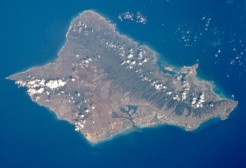O'ahu, Hawaii
| Nickname: The Gathering Place | |
|---|---|

Satellite photo of Oahu
|
|
 |
|
| Geography | |
| Location | 21°28′N 157°59′W / 21.467°N 157.983°W |
| Area | 596.7 sq mi (1,545 km2) |
| Area rank | 3rd largest Hawaiian Island |
| Highest elevation | 4,003 ft (1,220.1 m) |
| Highest point | Ka'ala |
| Administration | |
|
United States
|
|
| Symbols | |
| Demographics | |
| Population | 976,372 (2012) |
| Pop. density | 1,636 /sq mi (631.7 /km2) |
O‘ahu (pronounced [oˈʔɐhu], anglicized Oahu /oʊˈɑːhuː/) known as "The Gathering Place" is the third largest of the Hawaiian Islands. It is home to about two-thirds of the population of the U.S. state of Hawaii. The state capital, Honolulu, is on Oahu's southeast coast. Including small associated islands such as Ford Island and the islands in Kāneohe Bay and off the eastern (windward) coast, its area is 596.7 square miles (1,545.4 km2), making it the 20th largest island in the United States.
Oahu is 44 miles (71 km) long and 30 miles (48 km) across. Its shoreline is 227 miles (365 km) long. The island is composed of two separate shield volcanoes: the Waianae and Koolau Ranges, with a broad "valley" or saddle (the central Oahu Plain) between them. The highest point is Ka'ala in the Waianae Range, rising to 4,003 feet (1,220 m) above sea level.
The island was home to 953,207 people in 2010 (approximately 72% of the population of the state, with approximately 81% of those living in or near the Honolulu urban area). Oahu has for a long time been known as the "Gathering Place". The term Oahu has no confirmed meaning in Hawaiian, other than that of the place itself. Ancient Hawaiian tradition attributes the name's origin in the legend of Hawaiiloa, the Polynesian navigator credited with discovery of the Hawaiian Islands. The story relates that he named the island after a son.
...
Wikipedia
